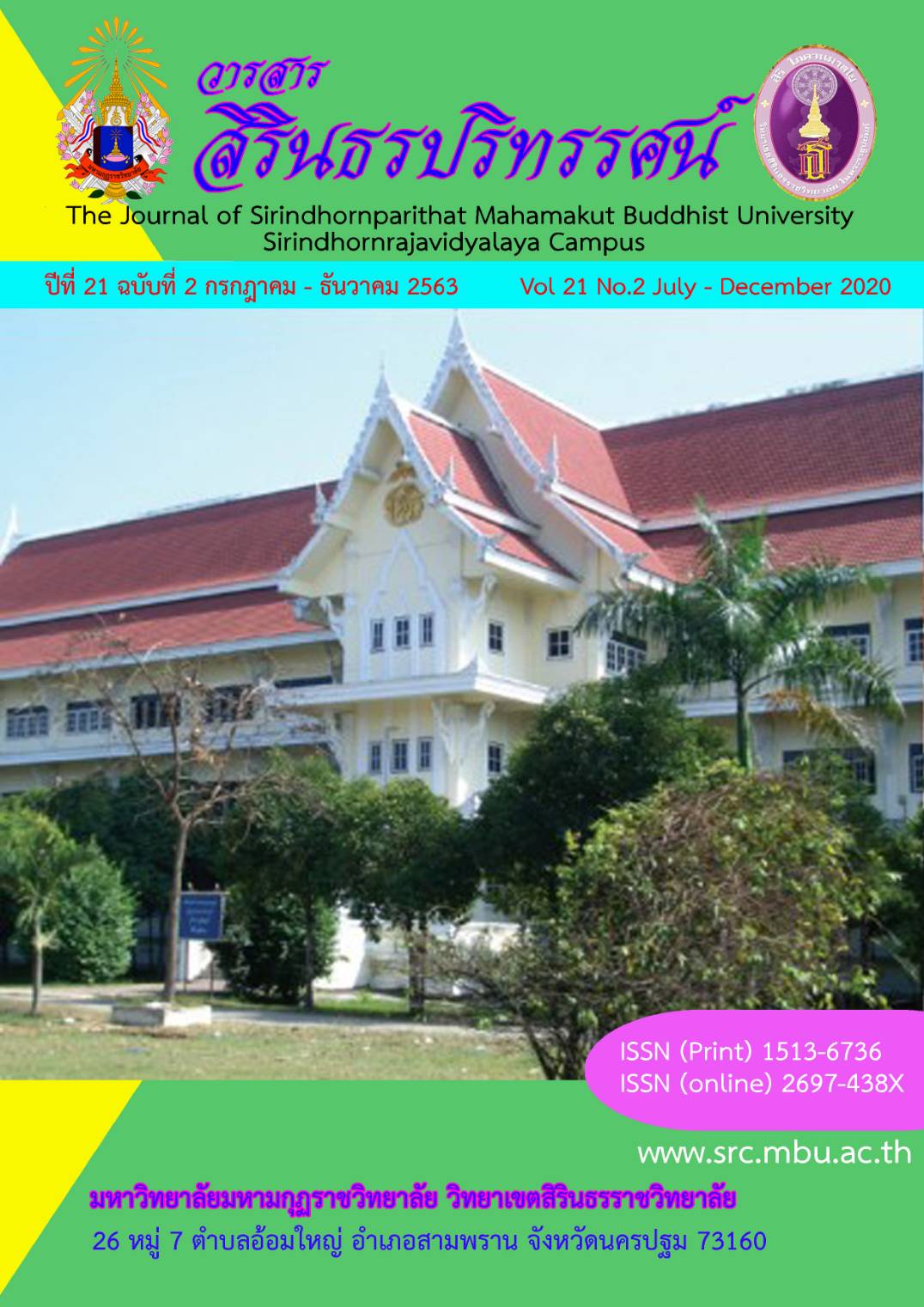Development of Professional Learning Community to Reinforce Active Learning Capacity of Teachers in Basic Education
Keywords:
Development of Professional, Learning Community to Reinforce, Active Learning Capacity, Basic EducationAbstract
This research aims to develop the professional learning community to reinforce active learning capacity of teachers in basic education. The four main research methodologies are: 1) studying necessary background knowledge of the professional learning community by synthesizing documents and interviewing 3 experts; 2) creating and checking the quality of professional learning community in order to reinforce active learning capacity of teachers in basic education by 9 experts and teachers in Baan Nong Nae school; 3) studying the professional learning community by collecting data from 30 teachers who enrolled in the project by using the test (multiple choices) to check if they could understand active learning capacity and using the form to evaluate their lesson plans, teaching methods, and attitudes which are analyzed by mean and standard deviation; and 4) evaluating teacher’s satisfactory to professional learning community in order to reinforce active learning capacity of teachers in basic education by 30 teachers who enrolled in the project and the data were evaluated by using mean, standard deviation, and content analysis.
The research results are found as follows:
- The results of the study on necessary background knowledge of professional community from analyzing and synthesizing the data such as vision, goal, leadership, togetherness, and attitude in order to develop professional community effectively are congruent and appropriate.
- With regard to the results of creating and checking the quality of professional community which are methodologies and evaluations, the evaluation ofsuitability from the experts showed that the overall mean of professional community using active learning capacity was in high level. Likewise, the evaluation ofguide book from the experts showed that the overall mean of professional community using active learning capacity was in high level.
- The study of professional community to reinforce active learning capacity of teachers in basic education showed that 1) the average mean of teachers’ knowledge of Thapluang Jae Ngam campus in primary educational service area office 3 before attending seminar was 10.73 whereas 18.17 was gained after attending the seminar; 2) the overall mean of professional community using active learning capacity of Thapluang Jae Ngam campus in primary educational service area office 3 was in high level; and 3) the evaluation of attitude in active learning capacity of Thapluang Jae Ngam campus in primary educational service area office 3 was in high level as well.
- Lastly, the teachers’ evaluation of professional community to reinforce active learning capacity of teachers in basic education from the teachers in Thapluang Jae Ngam campus in primary educational service area office 3 was also in high level.
References
กิ่งแก้ว ภูทองเงิน. (2561). “รูปแบบการพัฒนาครูตามแนวคิดชุมชนการเรียนรู้ เพื่อเสริมสร้างจิตสาธารณะของนักเรียน ระดับประถมศึกษา”. ปริญญานิพนธ์ครุศาสตรดุษฎีบัณฑิต สาขา หลักสูตรและการสอน. มหาวิทยาลัยมหาสารคาม.
ชูชาติ พ่วงสมจิตร์. (2560). “ชุมชนการเรียนรู้ทางวิชาชีพและแนวทางการนำมาใช้ในสถานศึกษา.” วารสารศึกษาศาสตร์ มสธ. 10 (1): 34-41.
ชูชาติ มงคลเมฆ. (2561). “การพัฒนารูปแบบการพัฒนาสมรรถนะครูแบบมีส่วนร่วมของโรงเรียนในสังกัดสำนักงานเขตพื้นที่การศึกษามัธยมศึกษา เขต 3”. ปริญญาครุศาสตรดุษฎีบัณฑิต สาขาวิชาการบริหารการศึกษา. มหาวิทยาลัยราชภัฏพระนครศรีอยุธยา.
ธัญญลักษณ์ เวชกามา. (2560). “การพัฒนาการดำเนินงานเสริมสร้างวินัยด้านความรับผิดชอบของนักเรียน โรงเรียนบ้านท่าเยี่ยมวิทยายล อำเภอเมืองยาง จังหวัดนครราชสีมา”. วิทยานิพนธ์การศึกษามหาบัณฑิต สาขาการบริหารการศึกษา. มหาวิทยาลัยนอร์ท กรุงเทพ.
นนทลี พรธาดาวิทย์. (2558). “การพัฒนาการจัดการเรียนรู้เชิงรุกในวิชาการจัดการเรียนรู้”. ปริญญานิพนธ์การศึกษามหาบัณฑิต สาขาหลักสูตรและการสอน คณะครุศาสตร์อุตสาหกรรม. มหาวิทยาลัยเทคโนโลยีราชมงคล ธัญบุรี.
นัฎชฎารัตน์ ณ นคร. (2559). “รูปแบบการพัฒนาสมรรถนะครูประถมศึกษา สังกัดสำนักงานคณะกรรมการการศึกษาขั้นพื้นฐาน จังหวัดภาคใต้ฝั่งทะเลอันดามัน”. วิทยานิพนธ์. มหาวิทยาลัยราชภัฏวไลยอลงกรณ์ ในพระบรมราชูปถัมภ์.
เนาวนิตย์ สงคราม. (2555). “ผลของการจัดการเรียนรู้ตามแนวคิดการเรียนรู้เชิงรุกและแนวคิดการเรียนการสอนบนเว็บแบบผสมผสาน เพื่อการออกแบบการศึกษานอกสถานที่เสมือนและส่งเสริมความคิดสร้างสรรค์ของนักศึกษาครุศาสตร์ ศึกษาศาสตร์ระดับปริญญาบัณฑิต”. วิทยานิพนธ์ศึกษาศาสตรมหาบัณฑิต สาขาหลักสูตรและการสอน. มหาวิทยาลัยมหาจุฬาลงกรณราชวิทยาลัย.
บุญชม ศรีสะอาด. (2559). การวิจัยเบื้องต้น. พิมพ์ครั้งที่ 9. กรุงเทพฯ : สุวีริยาสาส์น.
ปองทิพย์ เทพอารีย์. (2557). “การพัฒนารูปแบบชุมชนแห่งการเรียนรู้เชิงวิชาชีพสำหรับครูประถมศึกษา”. วารสารศิลปากรศึกษาศาสตร์วิจัย. 6 (2): 284-296.
พิณสุดา สิริธรังศรี. (2559). การยกระดับคุณภาพครูไทยในศตวรรษที่ 21. เอกสารประกอบการประชุมวิชาการ “อภิวัฒน์การเรียนรู้ สู่จุดเปลี่ยนประเทศไทย” จัดโดย สำนักงานสร้างเสริมสังคมแห่ง การเรียนรู้และคุณภาพเยาวชน (สสค.) ณ อิมแพค เมืองทองธานี เมื่อวันที่ 6-8 พฤษภาคม 2559.
ไพฑูรย์ สินลารัตน์. (2558). ทักษะแห่งศตวรรษที่ 21 ต้องก้าวให้พ้นกับดักของตะวันตก. กรุงเทพฯ: วิทยาลัยครุศาสตร์ มหาวิทยาลัยธุรกิจบัณฑิตย์.
มินตรา ลายสนิทเสรีกุล, และปิยพงษ์ สุเมตติกุล. (2557). “กลยุทธ์การบริหารโรงเรียนสู่การเป็นชุมชนแห่งการเรียนรู้วิชาชีพของโรงเรียนมัธยมศึกษาในสหวิทยาเขตเบญจบูรพา. กรุงเทพมหานคร”. วารสาร OJED. 9 (3): 392-406.
สรปรัชญ์ ไวกสิกรณ์. (2562). “รูปแบบการบริหารเพื่อเสริมสร้างสมรรถนะการวัดและประเมินผลการเรียนรู้ของครู ตามแนวทางของสถาบันทดสอบการศึกษาแห่งชาติ (องค์การมหาชน) ในโรงเรียน มัธยมศึกษา”. วิทยานิพนธ์ปรัชญาดุษฎีบัณฑิต สาขาการบริหารการศึกษา. มหาวิทยาลัยนอร์ท กรุงเทพ.
สินธวา คามดิษฐ์. (2559). การศึกษา 4.0 เป็นยิ่งกว่าการศึกษา. กรุงเทพฯ : โรงพิมพ์แห่งจุฬาลงกรณ์มหาวิทยาลัย.
สุภัทรา ภูษิตรัตนาวลี. (2560). “ศึกษาการพัฒนารูปแบบการจัดการเรียนรู้เชิงรุกสำหรับคณาจารย์วิทยาลัยเทคโนโลยีภาคใต้”. ปริญญานิพนธ์ปรัชญาดุษฎีบัณฑิต สาขาการวิจัยพฤติกรรมศาสตร์ ประยุกต์. มหาวิทยาลัยศรีนครินทรวิโรฒ.
แสงเดือน วงศ์ชวลิต. (2560). “กระบวนการเรียนแบบใฝ่รู้ (Active Learning) ที่มีผลต่อพฤติกรรมการเรียนรู้ ผลสัมฤทธิ์และความพึงพอใจในการเรียนรู้รายวิชาการวิจัยเพื่อพัฒนาการเรียนรู้ห้องเรียนภูมิภาค วิทยาลัยนาฏศิลปเชียงใหม่ สถาบันบัณฑิตพัฒนศิลป์”. วิทยาลัยนาฏศิลปเชียงใหม่ สถาบันบัณฑิตพัฒนศิลป์.
อำนาท เหลือน้อย. (2561). “รูปแบบการบริหารจัดการชุมชนแห่งการเรียนรู้ทางวิชาชีพของโรงเรียนมาตรฐานสากล”. ครุศาสตรดุษฎีบัณฑิต สาขาวิชาการบริหารการศึกษา. มหาวิทยาลัยราชภัฏนครสวรรค์.
Hord, S.M. (2009). Professional Learning Communities: Communities of Inquiry and Improvement. Austin: Southwest Educational Development Laboratory.
Stoll, L. (2010). “Professional learning communities: A review of the literature”. Journal of Education Change, 7, 221-258.
Sweller, J. (2006). The worked example effect and human cognition: Learning and Instruction. New Jersey: Educational Technologies.
Vescio, Ross & Adam. (2008). “A Review of Research on the Impact of Professional Learning Communities on Teaching Practice and Student Learning”. Teaching and Teacher Education: An International Journal of Research and Studies. 24 (1): 80-91.
Downloads
Published
Issue
Section
License
บทความที่ได้รับการตีพิมพ์เป็นลิขสิทธิ์ของ มหาวิทยาลัยมหามกุฏราชวิทยาลัย วิทยาเขตสิรินธรราชวิทยาลัย
ข้อความที่ปรากฏในบทความแต่ละเรื่องในวารสารวิชาการเล่มนี้เป็นความคิดเห็นส่วนตัวของผู้เขียนแต่ละท่านไม่เกี่ยวข้องกับหาวิทยาลัยมหามกุฏราชวิทยาลัย วิทยาเขตสิรินธรราชวิทยาลัย และคณาจารย์ท่านอื่นๆในมหาวิทยาลัยฯ แต่อย่างใด ความรับผิดชอบองค์ประกอบทั้งหมดของบทความแต่ละเรื่องเป็นของผู้เขียนแต่ละท่าน หากมีความผิดพลาดใดๆ ผู้เขียนแต่ละท่านจะรับผิดชอบบทความของตนเองแต่ผู้เดียว




